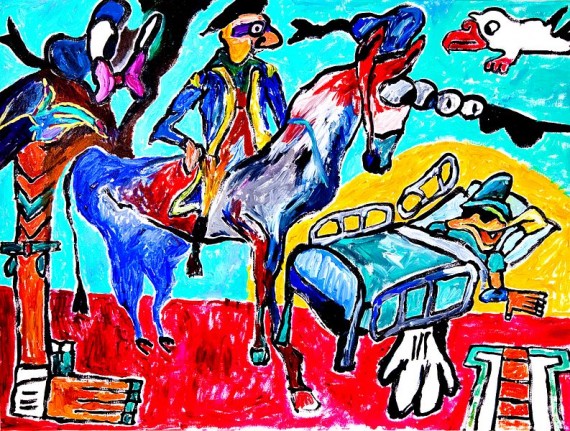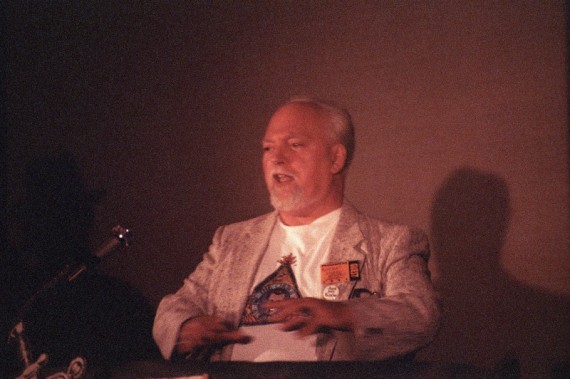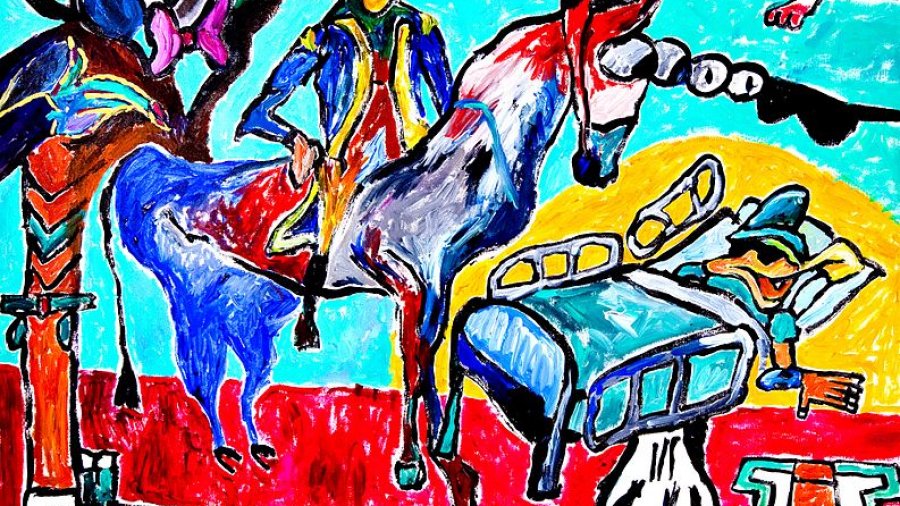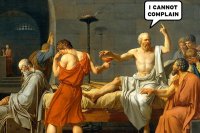“They just have a different reality tunnel, and every reality tunnel might tell us something interesting about our world, if we are willing to listen.”
— Robert Anton Wilson
Robert Anton Wilson, if you’re unaware, was something of a countercultural Gandalf, a white-haired wizard of skepticism and subversion. Wilson lived a remarkably diverse life, becoming, at various times, a novelist, essayist, philosopher, polymath, psychologist, editor, playwright, psychonaut, futurist, civil libertarian, Discordian Saint, and self-described agnostic mystic. A mouthful, I know—the man got shit done.

“Hospital Bed” by Adam Green. Photo Credit: Wiki Commons
Through his writings and lectures, Wilson became—alongside the likes of Timothy Leary, Alan Watts, Terence McKenna—a giant of American counterculture. He described his work as an “attempt to break down conditioned associations, to look at the world in a new way, with many models recognized as models or maps, and no one model elevated to the truth”. His goal being “to try to get people into a state of generalized agnosticism, not agnosticism about God alone but agnosticism about everything.”
Believe nothing?! Depressing! Demonic! Nihilistic!
For many, Wilson’s radical skepticism (a skepticism shared by many philosophers) is probably a frightening, even blasphemous proposition. However, in the videos that immortalize his legacy, Wilson has a way about him—a gentleness, a humor, a compassion—that seems in itself to serve as a counterexample to the notion that non-belief is somehow reprehensible or sinister. For Wilson, to believe absolutely was to die intellectually. A healthy mind was an ever-changing mind. For further insight into Wilson’s views, let’s examine two of his most famous memes:
Reality Tunnels: Perception as Gamble
“Long before quantum mechanics, the German philosopher, Husserl, said that “All perception is gamble.”
Every type of bigotry, every type of racism, sexism, prejudice, every dogmatic ideology that allows people to kill other people with a clear conscience, every stupid cult, every superstition, written religion, every kind of ignorance in the world all results from not realizing that our perceptions are gambles.
We believe what we see and then we believe our interpretation of it, we don’t even know we are making an interpretation most of the time. We think that this is reality. In philosophy that is called naïve realism. “What I perceive is reality.” And philosophers have refuted naïve realism every century for the last twenty-five hundred years starting with Buddha & Plato, and yet most people still act on the basis of naive realism.
Now the argument is maybe my perceptions are inaccurate but somewhere there is accuracy. The scientists have it with their instruments. That’s how we can find out what’s really real. But relativity and quantum mechanics have demonstrated clearly that what you find out with instruments is true relative only to the instrument you are using and where that instrument is located in space-time.
So there is no vantage point from which real reality can be seen, we are all looking from the point of our own reality tunnels. And when we begin to realize that we are all looking from the point of view of our own reality tunnels, we find it is much easier to understand where other people are coming from. Or, the ones who don’t have the same reality tunnels as us do not seem ignorant or deliberately perverse or lying or hypnotized by some mad ideology. They just have a different reality tunnel, and every reality tunnel might tell us something interesting about our world, if we are willing to listen.”
Wilson’s fundamental idea is that everything we think we know about the world is in fact an interpretation of the world. Most people seem to believe that their human nervous system provides direct access to objective reality—to Truth—but this is not the case. For individuals, all information is necessarily filtered through our senses, past experience, conditioning, prior beliefs, and other non-objective lenses. Even scientific findings, for all of their precision, reflect only relative truths, and those truths are further distorted by human cognition.
Thus, each of our individual worldviews should be considered one “reality tunnel”—a term Wilson borrowed from Tim Leary and expanded upon—out of seven billion, one for every human alive. Wilson emphasized that each person’s reality tunnel is their own artistic creation, whether or not they recognize it as such.

Robert Anton Wilson at Phenomicon in 1991. Photo Credit: Wiki Commons
Our perceptions are “gambles” in that they are essentially removed from objective reality, and furthermore in that they run the risk of being terribly ineffective or even disastrously inaccurate. For Wilson, proactively attuning to perception as such prevents the sort of certitude that leads to prejudice, discrimination, hate crimes, murders, and other destructive human tendencies that are rooted in inflexible ideology.
For Wilson, a healthy mind possesses a meta-awareness of itself as one subjective window through which to view the world. And when we cultivate this awareness, it becomes easier to look more closely at the views of others—to try on their reality tunnels—and to empathize with their way of seeing. Each person creates their own unique map of the world, and each person’s map might prove insightful in its own way, if we have the patience to consider it.
“Yeah, well, that’s just, like, your opinion, man.”
— The Dude
E-Prime: English Minus Certainty
As an organic extension of his general agnosticism, Robert Anton Wilson picked up and ran with the idea of an alternative version of the English language known as E-Prime. E-Prime was originally a suggested addition to general semantics, a program created by Alfred Korzybski to clarify and remedy the shortcomings of linguistic systems in human communication. From Wikipedia:
“E-Prime . . . is a prescriptive version of the English language that excludes all forms of the verb ‘to be’. . . .
Some scholars advocate using E-Prime as a device to clarify thinking and strengthen writing. For example, the sentence “the film was good” could not be expressed under the rules of E-Prime, and the speaker might instead say “I liked the film” or “the film made me laugh”. The E-Prime versions communicate the speaker’s experience rather than judgment, making it harder for the writer or reader to confuse opinion with fact.”
So the premise of E-Prime is that most usages of the verb ‘to be’ lead to inaccurate communication because they imply something absolute or objective when the speaker is merely detailing their opinion. For reasons that should be obvious, Wilson was smitten with this idea and made a concerted effort to eliminate forms of the verb “to be” from his writing and speech. He went as far as to say, ““Is”, “is.” “is”—the idiocy of the word haunts me. If it were abolished, human thought might begin to make sense. I don’t know what anything “is”; I only know how it seems to me at this moment.” On another occasion, Wilson said:
“Instead of thinking “The grass is green.”, [I] think “The grass appears green to me.”. And this saves me a lot of time, by the way. I don’t get embroiled in arguments like “Beethoven is better than Mozart.” or “Rock is better than Soul.” I define such things as meaningless, and so people get into arguments like that, I just say, well, Beethoven seems better to me than Mozart, most of the time, but I don’t say “Beethoven is better than Mozart.”
And on a later occasion:
“I return to E-Prime in my thinking whenever I find myself getting angry at somebody or feeling depressed or hopeless or having negative emotional states in general. Once you take all of the “is”s out of all of your negative statements you find out they’re all relative to how you feel at the moment.”
I find that last bit—the second paragraph—particularly instructive and meaningful. Some folks might not give a shit about clarifying their thinking or writing, but most of us care about dealing with negative emotional states. Instead of resorting to blanket statements such as “Life is a f***ing galactic shitstorm.”, we can note that “Life seems like a f***ing galactic shitstorm to me right now.”, and this simple trick can remind us that our supposition is relative to our current state, and that our state will, inevitably, change.
Agnosticism Does Not Mean Inaction
As stated, Wilson urges us to adopt a stance of agnosticism toward everything, suggesting that we ought not “believe” anything. There is a danger here, I think, in interpreting Wilson as promoting a sort of apathetic nihilism—a reason to do and care about nothing because we cannot know the ultimate truth or ramifications of our actions. I reject this outright, and I think the way Bob Wilson lived—as a bona fide doer and teacher—is sufficient evidence to assume he did as well.
The “belief” that Wilson disdained was something utterly static, with no room for change or reconsideration. Wilson, I think rightfully, saw in this sort of belief the seeds of antagonism and violence. However, I think he would agree that while our minds should always be open to expansion, many, many things are “true enough” (to employ a Wittgensteinian expression) to defend or to warrant action. Said another way, we may not have access to objectivity, but we can gather significant evidence for all sorts of very strong hunches about what is valuable and what is malignant to this planet and this whole human enterprise. As Bob once said:
“I don’t believe anything, but I have many suspicions.”
It seems clear that there are certain things we can strongly, strongly suspect are shitty—like, say, ethnic cleansing or environmental crises or enormous economic inequality or widespread starvation or torture. Sure, let’s be open to other ideas, but let’s be pragmatic and admit that certain hunches are pretty bulletproof—e.g. my strong feeling that I would not want someone to rape or murder me, and my derivative, compassion-based moral axiom that people should not murder or rape other people. If I come upon someone clearly sexually assaulting someone else, I’m not going to stop and say, “Hmm, maybe their reality tunnel permits this way of thinking.”; I’m going to hit that person with whatever hard, heavy object is within reach and ask questions later.
I think this anecdote can be extended to include many sorts of morality-based actions that we wish to pursue in the world. We can acknowledge (à la Nietzsche) that an absolute morality may not exist, but that doesn’t preclude us from also acknowledging the paramount societal function of moral feeling and consideration. I hope I haven’t caned this point to the brink of death, but I feel quite strongly about it. I think Bob would too. Agnosticism ≠ apathy.
That about does it for this introduction to the incomparable Robert Anton Wilson. I leave you with one last quote of Bob’s:
“Every fact of science was once damned. Every invention was considered impossible. Every discovery was a nervous shock to some orthodoxy. Every artistic innovation was denounced as fraud and folly. The entire web of culture and ‘progress,’ everything on earth that is man-made and not given to us by nature, is the concrete manifestation of some man’s refusal to bow to Authority. We would own no more, know no more, and be no more than the first apelike hominids if it were not for the rebellious, the recalcitrant, and the intransigent. As Oscar Wilde truly said, ‘Disobedience was man’s Original Virtue.’”
If this was wonderful, subscribe.
About Jordan Bates
Jordan Bates is a Lover of God, healer, mentor of leaders, writer, and music maker. The best way to keep up with his work is to join nearly 7,000 people who read his Substack newsletter.





I think you meant to say widespread economic inequality is shitty (not equality). Great article though!
great catch, tammi. can’t believe i’ve never noticed that error. i corrected it. glad you appreciated the article. take care. 🙂
Such a fantastically written and fresh perspective on reality tunnels, e prime, and the influence and significance of Robert Anton Wilton’s work. Had to share how excited and impressed I am with this article. I’ll be sharing it as a quintessential read in my various circles and outlets from now on. Looking forward to digging more into the site and seeing future posts on or related to this subject matter. Much respect and best regards from ATL USA. -Kevin G, owner of “Reality Tunnels”– a north GA based physical media preservation & retail business project ( Facebook.com/RealityTunnels ). Also an… Read more »
A really nice taste of Bob! I like “a countercultural Gandalf, a white-haired wizard of skepticism and subversion”. I like that as a description of his guerrilla ontology.
Robert Alton Wilson has helped me tremendously over the years. Thank you Jordan Bates for sharing this article.
you’re welcome! : ]
[…] I read Clarey for his libertarian economic insights. His Trump era rhetoric is a different reality tunnel to my life experience as a working class background, liberal arts major who he would probably […]
[…] The truth is, objective truth in itself is plagued by subjectivity. When looking at history, we see that each era had it’s own version of “truth”. The ancient Greeks had their beliefs in the twelve Gods, the Age of Enlightenment surrounded rationalism and philosophy, and the modern era is concerned with science and materialism. This is because each era had its own lens through which it was looking at reality. They had their own set of values, biases, and tools that affected the way they measured reality. This lens is called a reality tunnel. […]